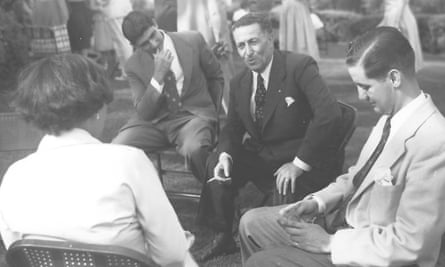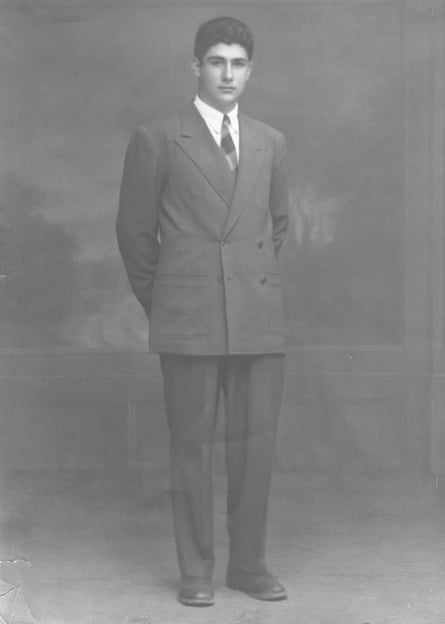Edward Said was clear and firm: the work of a critic, he argued, is more important than the work of poets and novelists. It is public intellectuals, he believed, who are the writers most able to challenge power and change the world.
But according to a new biography of the highly respected Palestinian scholar and literary critic, Said secretly wrote both poetry and fiction – not even mentioning it to his friends.
Said, who died in 2003, left behind two unfinished and abandoned novels, one rejected short story and at least 20 poems, the biography by Timothy Brennan discloses for the first time.
Brennan – a former student of Said’s who is now a professor of comparative literature at the University of Minnesota – was given unprecedented access by Said’s family to the unpublished manuscripts.
The biography, Places of Mind: a Life of Edward Said, which is published by Bloomsbury, sheds new light on how, after a lifetime of teaching literature, Said came to reject the novel in 1992 as a literary form.

“I think he finds there to be huge drawbacks to writing novels,” says Brennan. “He finds that there is a failure in the project of fiction if your intent is to change the world.” He now thinks Said’s conclusion that “for those who feel the drive to bring about political change, the novel is not the best vehicle to do it” is a conclusion born partly out of his own experiences as an unsuccessful writer of fiction.
By then, Said had discovered firsthand the challenges authors face when attempting a political intervention by writing novels – but chose to keep this potentially embarrassing personal insight a secret, along with his unpublished manuscripts.
When friends who are famous novelists wrote adoring letters to him, begging him to consider writing a novel, his correspondence shows he either ignored their requests or asked them, somewhat deceptively, what on earth he would write about. “He’s clearly going out of his way to keep it [his attempt to write fiction] from people. He’s misleading them,” Brennan says.
Brennan thinks, at the most, “maybe” only one or two people knew that Said tried to write novels. “Over and over again, when I interviewed people who knew him his entire life, they said they knew nothing about this.”
Both novels are political and autobiographical, and are set in the Middle East.

The first, a triptych called Elegy, is 70 pages long and takes place in the 1940s Cairo of Said’s childhood. He began writing it in 1957 when he was 22, more than 20 years before he wrote Orientalism, his famous postcolonial critique of the West’s depiction of “the Orient”.
Brennan thinks he was trying to find an accessible way to explain something that, as an American citizen living in the United States, he had realised most people simply did not understand: namely, “that there’s an independent culture that is Arab, which has successfully negotiated and resisted the imposition of foreign influence in places like Cairo.”
His poetry, Brennan says, is equally “steeped in Arabness”. Some poems written in the 1950s express “a clear anti-colonial feeling”, exploring how it feels to be “caught between two worlds” and grow up in the Levant, where – as Said writes in one of his novels – “everybody’s heads are turned like weather cocks to the West.”
Others appear to be deeply personal. “My favourite poem of his is a very sexualised and frightening one that I think he wrote about his troubled relationship with first wife, in 1962,” says Brennan.
In this poem, Little Transformation, published for the first time in the Observer today, “there’s this sudden revelation of feeling estranged and fearful of the person with whom you’ve been intimate. It expresses the doubt one has about the loyalty of the woman you love.”
While researching the book, Brennan discovered that Said was “absolutely obsessed” with the poetry of Gerard Manley Hopkins and would read poetry incessantly to his second wife. “I think he aspired to poetry. That was the secret self. It was a self that was gushier and more vulnerable than the self he would allow other people to see.”
The title of the only work of fiction he managed to complete is taken from a line in a Hopkins poem. An Ark for the Listener is a short story about a young man from Beirut who is gradually forced to reckon with “the palpable hurt” of Palestinian family friends forced out of their home. After this story was rejected by the New Yorker in 1965, Said gave up writing fiction for 25 years.
Importantly, these early, unpublished works demonstrate that Said was not apolitical before the Six-Day War in 1967, as is commonly believed. “That’s a myth – in so many ways, before then, he was deeply invested in the things that he later made his career doing,” says Brennan. “It’s fully formed.”
In 1987 Said started his second novel, a political thriller about betrayal. Set in Beirut in 1957, “it’s filled with espionage, very much like a John le Carré novel. It’s all about the political intrigues surrounding the invasion by the United States and the different forces who are involved.”
Said wrote about 50 pages, but abandoned it in favour of writing his memoir when he was diagnosed with leukaemia. He became even more convinced that “ultimately, intellectuals are more important” than authors: “They’re the ones who change the agendas and challenge the power.”
